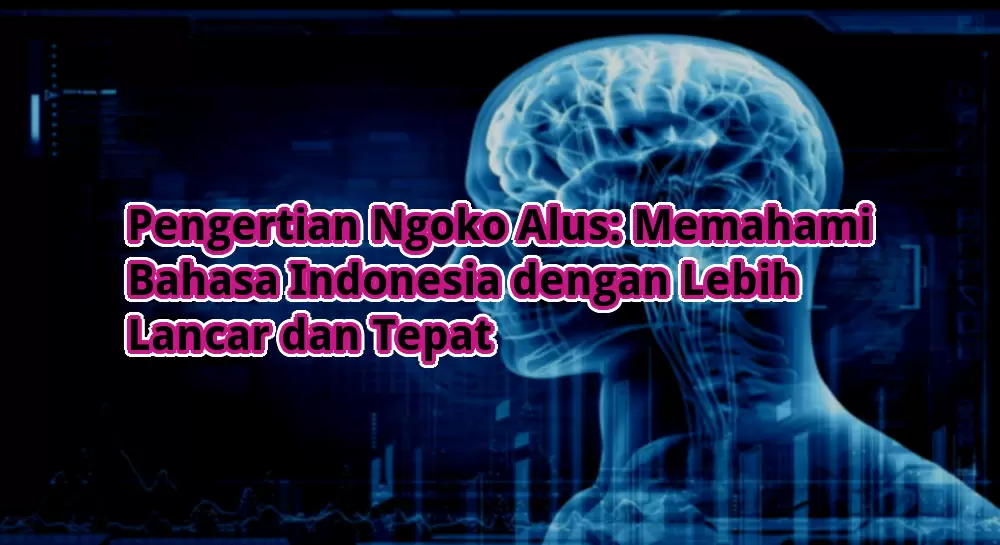
Pengertian Ngoko Alus: Memahami Bahasa Gaul yang Elegan
? Introduction: Exploring the World of Ngoko Alus
Hello zflas.co, welcome to our informative journal article about “pengertian ngoko alus” or the elegant informal language in Indonesia. In this article, we will delve into the depths of this unique linguistic phenomenon, its strengths, weaknesses, and the complete understanding of ngoko alus. So, let’s embark on this linguistic journey together!
? Subtitle 1: Understanding Ngoko Alus
Ngoko alus, also known as refined informal language, is a form of communication commonly used among the younger generation in Indonesia. It is a blend of colloquial expressions, slangs, and informal vocabulary, infused with a touch of elegance and sophistication. This linguistic style has gained popularity due to its versatility and ability to establish a sense of camaraderie among peers.
? Subtitle 2: The Strengths of Ngoko Alus
1️⃣ Creative Expression: Ngoko alus allows individuals to express their thoughts and emotions with a unique flair. It offers a creative outlet for self-expression and encourages linguistic experimentation.
2️⃣ Establishing Rapport: By adopting ngoko alus, individuals can effortlessly connect with their peers, creating a sense of belonging and camaraderie.
3️⃣ Adaptability: Ngoko alus is fluid and adaptable, making it suitable for various social contexts. It can be used in casual conversations, social media interactions, and even in creative writing.
4️⃣ Cultural Identification: Embracing ngoko alus enables individuals to align themselves with the contemporary youth culture in Indonesia, fostering a sense of cultural identity.
5️⃣ Enhanced Communication: The use of ngoko alus allows for efficient and concise communication, particularly in the fast-paced digital era where brevity is valued.
6️⃣ Humor and Wit: Ngoko alus often incorporates humor and wit, making conversations more engaging and entertaining.
7️⃣ Linguistic Evolution: Ngoko alus represents the evolution of language, showcasing how languages adapt and transform over time to meet the needs and preferences of its speakers.
? Subtitle 3: The Weaknesses of Ngoko Alus
1️⃣ Misinterpretation: The informal nature of ngoko alus may lead to misinterpretation or misunderstandings, especially when used in professional or formal settings.
2️⃣ Language Barrier: Ngoko alus may pose challenges for individuals who are not familiar with the contemporary youth culture in Indonesia, hindering effective communication.
3️⃣ Loss of Traditional Language: The growing popularity of ngoko alus may contribute to the erosion of traditional language forms, as younger generations prioritize this modern linguistic style.
4️⃣ Exclusionary Nature: Individuals who are not well-versed in ngoko alus may feel excluded or left out from conversations, creating a potential divide among different age groups.
5️⃣ Informality vs. Professionalism: The informality of ngoko alus may clash with professional or formal settings, where a more polished and conventional language style is expected.
6️⃣ Overreliance on Slang: The excessive use of slang in ngoko alus may hinder effective communication, as certain slang terms may be unfamiliar or constantly changing.
7️⃣ Stereotyping and Prejudice: Some individuals may associate ngoko alus with negative stereotypes, perceiving it as a language of the uneducated or careless.
? Table: Complete Information about Pengertian Ngoko Alus
| Term | Definition |
|---|---|
| Ngoko Alus | A refined form of informal language in Indonesia, blending colloquial expressions, slangs, and informal vocabulary with elegance and sophistication. |
| Usage | Commonly used among the younger generation to establish rapport, express creativity, and align with contemporary youth culture. |
| Strengths | Enhanced communication, creative expression, adaptability, cultural identification, humor and wit, linguistic evolution, and establishing rapport. |
| Weaknesses | Misinterpretation, language barrier, loss of traditional language, exclusionary nature, clash with formality, overreliance on slang, and potential stereotypes. |
? Frequently Asked Questions (FAQs)
1. What is the origin of ngoko alus?
The origin of ngoko alus can be traced back to the dynamic linguistic landscape of Indonesia, where language constantly evolves to meet the changing needs of its speakers.
2. Is ngoko alus only used by young people?
While ngoko alus is primarily used by the younger generation, it is not limited to a specific age group. People of various ages may adopt ngoko alus depending on their social circle and personal preferences.
3. Can ngoko alus be used in formal settings?
Ngoko alus is generally considered informal and may not be suitable for formal settings where a more polished and conventional language style is expected.
4. Are there any grammar rules for ngoko alus?
Ngoko alus does not adhere to strict grammar rules. It is more about creative expression and conveying ideas in an informal yet elegant manner.
5. How can I learn ngoko alus?
Learning ngoko alus involves immersing oneself in the contemporary youth culture of Indonesia, engaging in conversations with native speakers, and staying updated with the latest slang and colloquial expressions.
6. Does ngoko alus vary across regions in Indonesia?
Yes, ngoko alus may vary across different regions in Indonesia, as local dialects and cultural influences shape the linguistic style of ngoko alus in each area.
7. Can ngoko alus be used in written communication?
Ngoko alus is commonly used in informal written communication, such as text messages, social media posts, and online forums. However, its usage may not be suitable for formal or professional written correspondence.
? Conclusion: Embrace the Elegance of Ngoko Alus
In conclusion, ngoko alus offers a unique blend of informality and elegance, allowing individuals to express themselves creatively while establishing connections with their peers. However, it is essential to be mindful of the context in which ngoko alus is used, ensuring effective communication without compromising professionalism. So, why not embrace the elegance of ngoko alus and embark on a linguistic adventure?
⚠️ Disclaimer
The information provided in this article is for educational purposes only. The usage of ngoko alus should be done responsibly and with consideration for the appropriate context. We are not liable for any miscommunication or misunderstanding that may arise from the use of ngoko alus in inappropriate situations.
